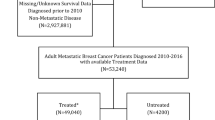Abstract
The number of patients with breast cancer who participate in therapeutic clinical trials remains low. One reason is a lack of opportunity; another is health care providers who do not recommend trials because they fear poorer outcome from the use of new drugs. Thus, we compared survival outcome in patients with metastatic breast cancer (MBC) who participated in first-line therapeutic clinical trials with outcome in patients who had never enrolled in a clinical trial and received only standard care. We hypothesized that first-line therapeutic clinical trials does not have a negative survival outcome. We reviewed the records of patients with MBC who were treated at MD Anderson Cancer Center between January 2000, and December 2010. The medical records of 5501 patients with MBC were screened, and 652 patients—285 in the trial arm and 367 in the control arm—met our specific eligible criteria. The median follow-up of our cohort was 7.16 years (95 % confidence interval [CI] 6.53–7.64 years). Among the global population, no significant differences in progression-free survival (PFS) or overall survival (OS) were observed between the treatment arms: for the clinical trial cohort, median PFS was 7 months (95 % CI 5.72–8.71 months), and median OS was 28.48 months (95 % CI 22.70–34.60 months). For the control cohort, median PFS was 10.02 months (95 % CI 7.13–11.99 months), and median OS was 28.71 months (95 % CI 24.41–31.31 months) (P = .089 and .335, respectively). Enrollment in first-line MBC therapeutic clinical trials does not result in less favorable survival outcome than that in MBC patients who never enrolled in a clinical trial.



Similar content being viewed by others
References
Chow CJ, Habermann EB, Abraham A et al (2013) Does enrollment in cancer trials improve survival? J Am Coll Surg 216:774–780 (discussion 780–781)
Al-Refaie WB, Vickers SM, Zhong W et al (2011) Cancer trials versus the real world in the United States. Ann Surg 254:438–442 (discussion 442–443)
Ford JG, Howerton MW, Lai GY et al (2008) Barriers to recruiting underrepresented populations to cancer clinical trials: a systematic review. Cancer 112:228–242
Fleisher L, Ruggieri DG, Miller SM et al (2014) Application of best practice approaches for designing decision support tools: the preparatory education about clinical trials (PRE-ACT) study. Patient Educ Couns 96:63–71
Peppercorn JM, Weeks JC, Cook EF, Joffe S (2004) Comparison of outcomes in cancer patients treated within and outside clinical trials: conceptual framework and structured review. Lancet 363:263–270
Mayers C, Panzarella T, Tannock IF (2001) Analysis of the prognostic effects of inclusion in a clinical trial and of myelosuppression on survival after adjuvant chemotherapy for breast carcinoma. Cancer 91:2246–2257
Wheler J, Tsimberidou AM, Moulder S et al (2010) Clinical outcomes of patients with breast cancer in a phase I clinic: the M. D. Anderson cancer center experience. Clin Breast Cancer 10:46–51
Davis S, Wright PW, Schulman SF et al (1985) Participants in prospective, randomized clinical trials for resected non-small cell lung cancer have improved survival compared with nonparticipants in such trials. Cancer 56:1710–1718
Murthy VH, Krumholz HM, Gross CP (2004) Participation in cancer clinical trials: race-, sex-, and age-based disparities. JAMA 291:2720–2726
Simon MS, Du W, Flaherty L et al (2004) Factors associated with breast cancer clinical trials participation and enrollment at a large academic medical center. J Clin Oncol Off J Am Soc Clin Oncol 22:2046–2052
Baggstrom MQ, Waqar SN, Sezhiyan AK et al (2011) Barriers to enrollment in non-small cell lung cancer therapeutic clinical trials. J Thorac Oncol Off Publ Int Assoc Study Lung Cancer 6:98–102
Fouad MN, Lee JY, Catalano PJ et al (2013) Enrollment of patients with lung and colorectal cancers onto clinical trials. J Oncol Pract Am Soc Clin Oncol 9:e40–e47
Du W, Gadgeel SM, Simon MS (2006) Predictors of enrollment in lung cancer clinical trials. Cancer 106:420–425
Lara PN Jr, Higdon R, Lim N et al (2001) Prospective evaluation of cancer clinical trial accrual patterns: identifying potential barriers to enrollment. J Clin Oncol Off J Am Soc Clin Oncol 19:1728–1733
StatBite (2009) Global survey: women living with metastatic breast cancer and clinical trial participation. J Natl Cancer Inst 101:779
Avis NE, Smith KW, Link CL et al (2006) Factors associated with participation in breast cancer treatment clinical trials. J Clin Oncol Off J Am Soc Clin Oncol 24:1860–1867
Brown RF, Cadet DL, Houlihan RH et al (2013) Perceptions of participation in a phase I, II, or III clinical trial among African American patients with cancer: what do refusers say? J Oncol Pract Am Soc Clin Oncol 9:287–293
Schwentner L, Van Ewijk R, Kurzeder C et al (2013) Participation in adjuvant clinical breast cancer trials: does study participation improve survival compared to guideline adherent adjuvant treatment? A retrospective multi-centre cohort study of 9,433 patients. Eur J Cancer Oxf Engl 49:553–563
Acknowledgments
We thank the Morgan Welch Inflammatory Breast Cancer Research Program for support. We also thank the Department of Scientific Publications at MD Anderson for manuscript editing.
Author contributions
Conception and design: all authors. Administrative support: Jie Wiley. Provision of study materials or patients: Limin Shu. Collection and assembly of data: Fanny Le Du, Takeo Fujii, Limin Shu. Data analysis and interpretation: Fanny Le Du, Takeo Fujii, Naoto T Ueno, Minjeong Park, Diane D Liu. Manuscript writing: all authors. Final approval of manuscript: all authors.
Funding
This work was supported in part by grants from the Eugène Marquis Cancer Center, Rennes, France (to F. Le Du), the Morgan Welch Inflammatory Breast Cancer Research Program, and the State of Texas Rare and Aggressive Breast Cancer Research Program.
Author information
Authors and Affiliations
Corresponding author
Ethics declarations
Conflicts of interest
The authors declare that they have no conflicts of interest.
Additional information
Fanny Le Du and Takeo Fujii equally contributed to this work.
Rights and permissions
About this article
Cite this article
Le Du, F., Fujii, T., Park, M. et al. Impact of clinical trial on survival outcomes. Breast Cancer Res Treat 159, 273–281 (2016). https://doi.org/10.1007/s10549-016-3942-5
Received:
Accepted:
Published:
Issue Date:
DOI: https://doi.org/10.1007/s10549-016-3942-5



